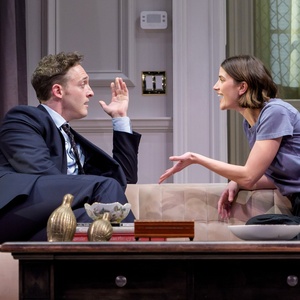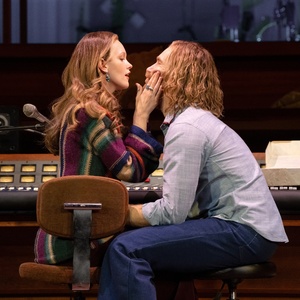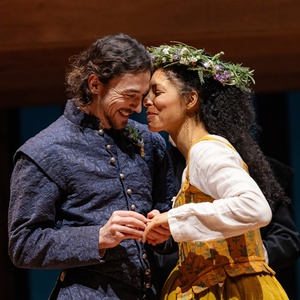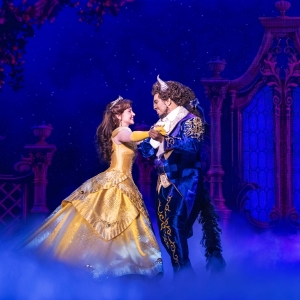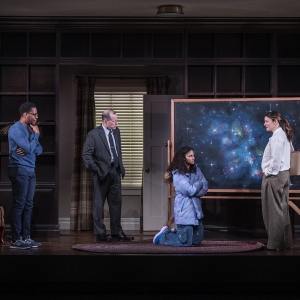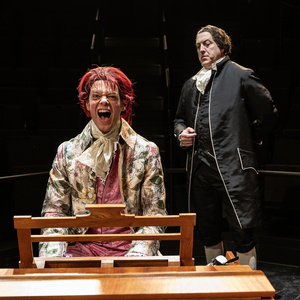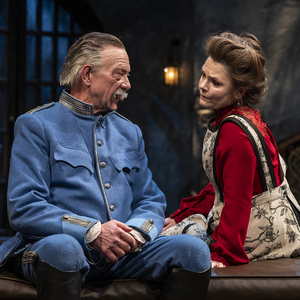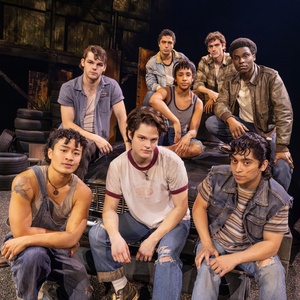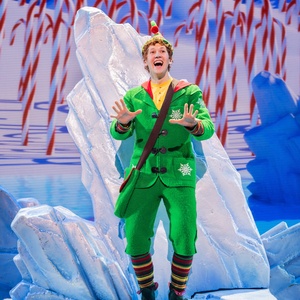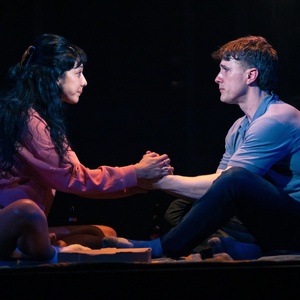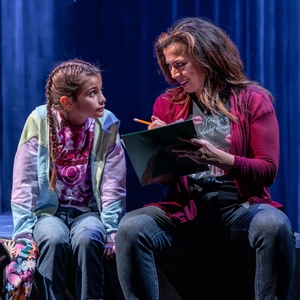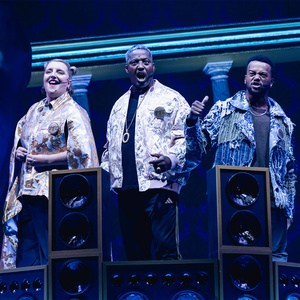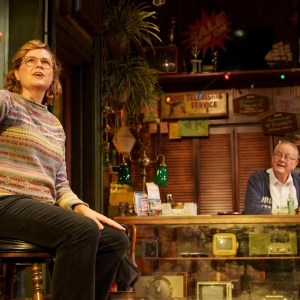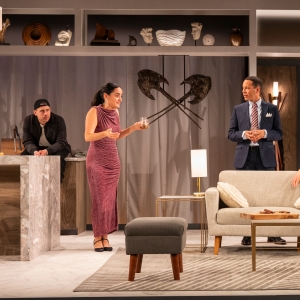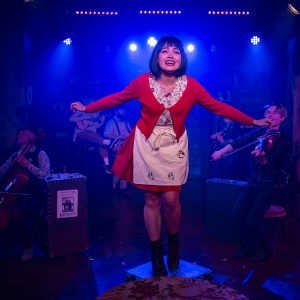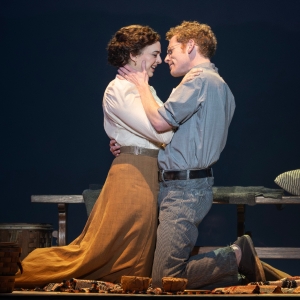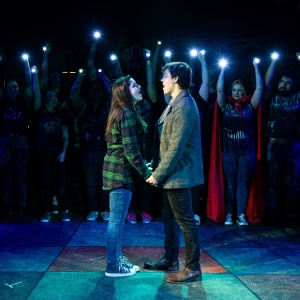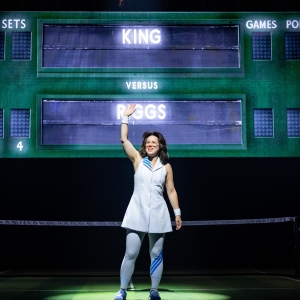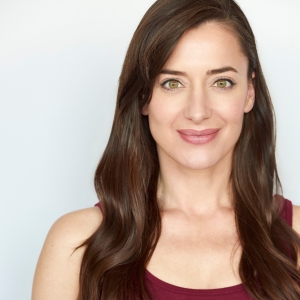Review: THE DANCE OF DEATH at Steppenwolf Theatre CompanyFebruary 19, 2026When I think of Steppenwolf, I often think of family members crying, screaming at one another, or some combination of the two. So the sparring between spouses Alice and Captain Edgar in August Strindberg’s 1900 play THE DANCE OF DEATH feels right at home. In a surprisingly funny and sharp version from accomplished Irish playwright Conor McPherson and direction from Steppenwolf ensemble member Yasen Peyankov, Kathryn Erbe and Jeff Perry go toe-to-toe as a troubled married couple about to celebrate their silver anniversary.
Review: THE OUTSIDERS First National Tour Presented by Broadway in ChicagoFebruary 13, 2026THE OUTSIDERS presents an original and vibrant stage adaptation of S.E. Hinton’s classic 1967 novel about the conflict between Tulsa teen gangs the Greasers and the Socs (short for socialites). The musical — and particularly director Danya Taymor’s inventive and visually dynamic staging — pulses with youthful energy, but the material doesn’t feel juvenile.
Review: STEREOPHONIC National Tour Presented by Broadway In ChicagoJanuary 29, 2026David Adjmi’s STEREOPHONIC pulls back the curtain on making a rock album — with all of the minute details, inane band member conversations, and painstaking, spirited artistic conversations that come with it. It centers on an unnamed Fleetwood Mac-esque band in the late 1970s as they record (and deliberate over) their newest album at a studio in California. If diving deep into the minutiae of the recording process excites you, STEREOPHONIC is your ticket. Fans of DAISY JONES AND THE SIX — both the Taylor Jenkins Reid novel and the Amazon miniseries based on it — will love this.
Review: ELF THE MUSICAL at Broadway In ChicagoDecember 4, 2025Thanks to Buddy the Elf, ELF THE MUSICAL has plenty of holiday cheer. Jack Ducat has large shoes to fill as the beloved film character Buddy, a now adult man raised on the North Pole by Santa (Andrew Hendrick) and his elves— who must then venture into the wilds of New York City to meet his human father. Will Ferrell’s performance in the original 2003 film is embedded in the holiday movie zeitgeist — so it’s a big ask.
Review: AMADEUS at Steppenwolf Theatre CompanyNovember 17, 2025AMADEUS at Steppenwolf Theatre Company is a lively and sprawling production of Peter Shaffer’s play. Director Robert Falls, the recently retired former Goodman Theatre Artistic Director, makes his Steppenwolf directorial debut with one of the best uses of Steppenwolf’s Ensemble Theater I’ve seen.
Review: HELL'S KITCHEN National Tour Presented by Broadway In ChicagoNovember 13, 2025HELL’S KITCHEN, the Alicia Keys jukebox musical now making its Chicago premiere as part of the first national tour, has a messy storyline wrapped in slick packaging. While the show is loosely based on Keys’s childhood in Manhattan, the storytelling is generic, and the songs are often awkwardly incorporated into the book. Admittedly, Kristoffer Diaz’s book is weak. It’s a flimsy vehicle for Keys’s song catalog. Huge Alicia Keys fans might enjoy hearing her biggest hits performed by musical theater actors, but the plot around them doesn’t hang together.
Review: PARANORMAL ACTIVITY at Chicago Shakespeare TheaterOctober 17, 2025This new PARANORMAL ACTIVITY play (based on Paramount Pictures’ PARANORMAL ACTIVITY horror films) has terrific stage effects and absolutely creeped me out. Based on the merits of the script alone, there’s not much to recommend in the material. But it leaves plenty of room for creepy effects and terrifying stage surprises — and the inventive and frightful production is definitely the selling point!
Review: REVOLUTION(S) at Goodman TheatreOctober 16, 2025REVOLUTION(S) is truly unlike any other show I’ve seen at the Goodman. While I think the material still has some rough edges, that’s fitting of the subject matter. The themes introduced here aren’t neat and tidy, so the material shouldn’t be, either. This musical has a pulsing, urgent energy that is extremely well-matched by Tom Morello’s music and lyrics.
Review: ROME SWEET ROME at Chicago Shakespeare TheaterSeptember 29, 2025ROME SWEET ROME, the latest production from the Q Brothers Collective at Chicago Shakespeare Theater, has a cool concept: JULIUS CAESAR, but make it hip hop. Like the group’s previous endeavors, the show takes a classic Shakespeare play and updates it with modern sensibilities. The resulting show, though, is really on the nose, both in terms of parallels to the current political climate (here, Caesar is an authoritarian leader who loves the sound of his own voice) and in the writing itself.
Review: MR. WOLF at Steppenwolf Theatre CompanySeptember 22, 2025MR. WOLF simultaneously fascinated and repulsed me. This play from Rajiv Joseph, now in its Chicago premiere to kick off Steppenwolf’s 50th anniversary season, is gripping and terrifying.
Review: ASHLAND AVENUE at Goodman TheatreSeptember 22, 2025ASHLAND AVENUE is a genial and charming play set in Chicago. Directed by Goodman Theatre’s Artistic Director Susan Booth, the Chicago setting of Lee Kirk’s world premiere certainly seems fitting for the opening of the theater’s centennial season. But this isn’t the kind of gritty, metaphorical “blood on the walls” kind of play often associated with Chicago-style theater. Instead, Kirk’s story about a Chicago family-owned business is much gentler.
Review: TWIHARD! A TWILIGHT MUSICAL PARODY at Apollo TheaterJuly 28, 2025TWIHARD! A TWILIGHT MUSICAL PARODY should be veritable millennial theater nerd catnip. I admire creator Tiffany Keane Schaefer’s vision, but ultimately TWIHARD needed to try harder at bringing a legitimately humorous parody to the stage.
Review: BILLIE JEAN at Chicago Shakespeare TheaterJuly 25, 2025In Chilina Kennedy, director Marc Bruni and Lauren M. Gunderson have found a tenacious and hard-hitting actor to play the eponymous tennis legend in BILLIE JEAN. The role of Billie Jean King, who tirelessly fought for women to have equal pay in professional tennis, necessarily centers the play. Kennedy’s boundless energy and appealing spunk really give it life.



